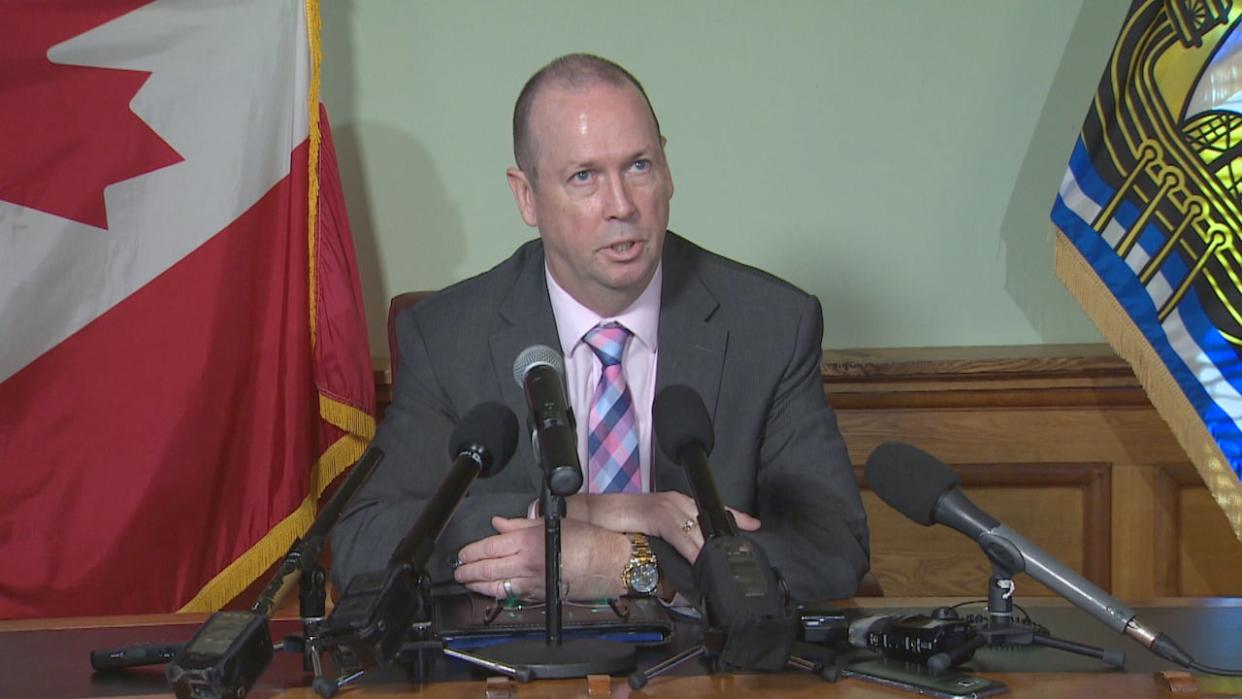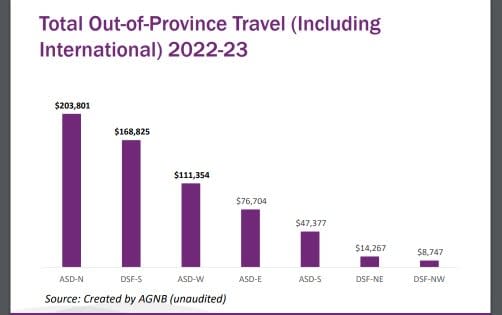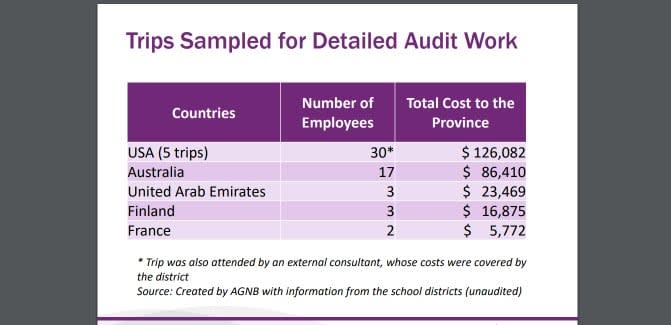School employee trips to Dubai, Australia, France draw auditor general scrutiny

New Brunswick Auditor General Paul Martin raised questions in his annual report about whether three school districts followed government rules when sending dozens of employees around the world for training.
Martin said districts often failed to provide the proper paperwork to justify the trips as a good use of taxpayer money.
His report made note of trips to France, Dubai, Australia and several trips to the United States.
The Anglophone North School School District, for example, sent 17 employees to Australia for the World Indigenous Peoples Conference on Education at a cost of $86,410.
"There [were] some pretty big trips that were approved here," said Martin after delivering his report in a livestreamed event on Thursday.
A government press release on the audit said it found "instances of district staff not having documented approval to travel, including a lack of appropriate signatures and cost estimates."
"There were often no documented anticipated or actual benefits to government," the release said.
Martin highlighted a number of specific trips in his report.
Trip to Apple HQ in California
The Francophone South School District, for example, sent 13 employees — and an "external consultant" whose expenses were also paid — to train at Apple's headquarters in California at a cost of $48,605.
It also spent $23,469 to send three employees to an education seminar in Dubai.
A spokesperson for the Francophone South School District said the district normally uses video conferences for most "interactions with colleagues or partners abroad."
In specific situations, however, "travel becomes essential," said Jean-Luc Thériault.

The auditor general's report listed spending by individual school district, with Anglophone North leading all others. (Government of New Brunswick)
To stay "current," he said it's important to "draw inspiration from what is happening elsewhere, both nationally and internationally." And that often requires "direct interaction to ensure the quality of exchanges."
He said "while we adhere to the Department of Education and Early Childhood Development guidelines and financial approval processes, there are instances where certain transactions or information are not documented in paper form, as preferred."
While they don't track "all necessary paper documents, Thériault said they have "developed, internally, alternative methods, including digital technologies, to enhance the efficiency of certain processes and information gathering."
He said they're working on an online form "to document and obtain approvals in a centralized location."
17 ASD-North employees visited Australia
A spokesperson for the Anglophone North School District, which had the highest spending of any district, said the World Indigenous Peoples conference "was an important step in ASD-N's commitment to meet goals in the Truth and Reconciliation Commission's calls to action."
Meredith Caissie said "a large percentage of ASD-N students identify as First Nation. In addition, ASD-N had multiple staff who were selected to present at the conference. Since that conference, ASD-N has grown its First Nation education program and has shared resources with other partners across the province."
Caissie said although the district believes it has followed proper travel procedures, "we do accept the recommendations made and have already taken steps to implement tighter documentation procedures where it relates to out of province and out of country travel."
ASD-West spending below average for size, says district
A spokesperson for the Anglophone West School District, which had the third-highest travel costs, said the district's spending was actually below average when its size is factored in.
In an emailed statement on Thursday, Paul MacIntosh said they are the province's largest district.
"Further to this, we are satisfied that as per paragraph 6.28, the auditor found that 'ASD-W was able to provide adequate documentation detailing the estimated cost and appropriate approvals for the three trips examined.'"
MacIntosh said the expenses incurred were for "highly valuable professional development opportunities and in one case an opportunity to showcase proprietary programming on an international level."
He said the district believes "all ASD-W travel was compliant with expectations that we have within our district."

The auditor general listed a number of examples of trips that his department reviewed. (Government of New Brunswick)
The auditor general said it's not his place to question whether any of the districts "had to go or didn't have to go."
He said districts have the power to make those decisions, "however, it should be in the best interest of also managing their budgets, taxpayer dollars, and with the proper paperwork to support that it was a value to them."
He said various documentation is required to "substantiate" the value of each trip before the trip is approved. More paperwork after the trip is used to determine whether that value was "achieved."
"And that's where the documentation was lacking," explained Martin. "It was not documented. It was not supported."
He said his job is to ensure that the rules were followed.
"People in charge need to be held accountable. And it's very simple. The policy's there."
But he did say the report raises the question of whether the money could have been better spent elsewhere. He said the COVID-19 pandemic has shown there are other, more cost-effective, ways to train employees.
"It could be that that money could be better used in other ways at the school levels and virtual attendance may have served the same purpose. So we're at least asking the districts to consider that in their decision process."
Martin said he's hopeful districts will respond to the "wake-up call … to make sure you have this stuff documented. We may come back and look some more."


